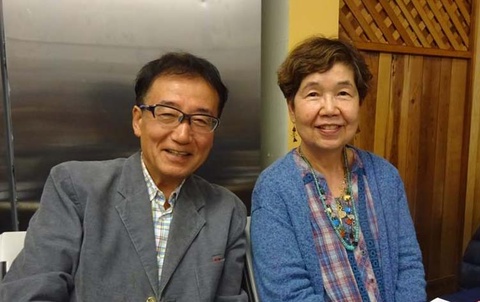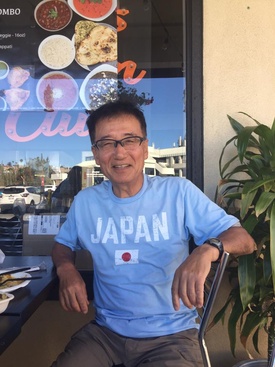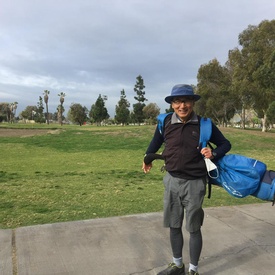
Final home in Japan
Shinya Miyata, who I interviewed online, was smiling broadly on the other side of the screen. He told me that he had just returned to Japan after four years from Los Angeles, where entry restrictions had been lifted, and that his one month stay in Japan had been as enjoyable as a dream.
"The reason I came back to Japan this time is because I hadn't been back in four years and I wanted to go back after a long time. The other reason was to check out a nursing home that provides services. I looked at two facilities and decided on a home in Setagaya, but the problem is that there are still no vacancies. I will probably wait until the end of this year or the beginning of next year and then return to Japan."
Miyata, now 77 years old, has been living in the US for 41 years. At the age of 36, he was posted to the US branch of an advertising agency as a resident.

"At first I had planned to return to Japan after a few years, but somehow I ended up here. I love golf and had a great time here, and my wife also plays tennis, so (Los Angeles) was the perfect environment. My children also got used to life here, so when I told my company I wanted to stay three years after arriving in the US, they gave me permission and I got my green card."
However, it seems he was determined that Japan would be his final resting place.
"My wife and I had talked about relocating by the time we're 80, that is, before we run out of energy. In the last few years, that has become more of a reality. My wife in particular has started to worry about medical care. Both my wife and I have had cataract surgery, and while there are still general internal medicine options available in Japanese, when it comes to specialists, there are no nurses or doctors who speak Japanese. Consent forms before surgery are also written in English. Also, as your eyesight deteriorates, driving at night becomes worrying. Furthermore, over the past few years, my wife's friends have started to relocate to Japan one after another."
The deciding factor is healthcare and public safety
When Miyata returned to Japan in March 2023, he visited a hospital in Tokyo.
"My neck was hurting, and maybe it was because I had played too much golf. A Japanese friend recommended a hospital to me, so I went there, and my experience there was just amazing. First, I went there at around 11:30 without making a reservation, got my numbered ticket, and was having dinner in the restaurant inside the hospital when it was time for my appointment. They took an X-ray, and the doctor looked at it right away and said, 'You've got damage to your cervical vertebrae. I'll fix it for you.'
When I told them I didn't have health insurance in Japan, I was asked to pay a deposit of 30,000 yen, which seemed very cheap by American standards, so I paid it straight away. However, the actual consultation fee was even cheaper, at 25,000 yen, which really surprised me."
His experience at the hospital in Tokyo further convinced Miyata that "permanently returning to Japan was the right decision."
"Also, it's really easy to get around. You can get around here and there without changing trains, and there are taxis everywhere, so there's no need to call an Uber. Even when you eat out, it's delicious and cheap. I stayed in a serviced apartment at the Imperial Hotel for a month, and it cost $3,000. That's just $100 a night.
And the public safety is good. I tend to wander around aimlessly when I'm drunk, so I don't have to worry about walking around at night. First of all, no one carries a gun. There are police stations here and there, so it's very safe."
Be yourself wherever you are
Why did Mr. and Mrs. Miyata choose senior housing?
"At first, I was thinking of buying a used apartment in Tokyo. But my wife said it would be a hassle to move from the apartment to senior housing. I thought she had a point, so we decided to move into senior housing from the start. But we wanted it to be as spacious as possible, so we looked for a facility over 100 square meters. There were only two in Tokyo.
What made us decide to move into the Setagaya property was the trial stay. I stayed one night and my wife stayed two, eating in the meals and checking out how comfortable it was to live in. For me, the mahjong room was what attracted us, but there was also a hot spring, a karaoke room, and even a clinic, and everything else was available on-site. My wife made friends during the trial stay, and liked it so much that she said, "I'm going to stay here," so we decided to move in. The other property we looked at was a high-rise apartment building, so we were worried about what would happen in an earthquake."
So what do they miss about America?
"My wife doesn't seem to have any interest at all. As for me, it's probably golf. When I go back to Japan, I won't drive anymore, and it's too expensive, so I've decided not to play golf anymore. Do you think I could keep up with the Japanese way of thinking, which is different to the free-spirited America? I've always been a free-spirited person. I met up with a friend from college during my recent stay, and he told me, 'You're still doing whatever you want,' so I'll do what I want in Japan too, and I don't mind what people say at all."
Now, Miyata will have to start sorting out his assets in the United States, where he has lived for over 40 years, and preparing to move, but he says he has no worries at all.
"It's something that everyone has to do when they return to Japan. I don't think it's that much of a hassle. I just prepare quietly. My wife says that there are memories attached to all kinds of things, but I think you should just throw them away (laughs)."
From start to finish, Miyata-san was smiling and said that he couldn't wait to return to Japan. He must have thoroughly enjoyed his 41 years in America and had no regrets. I could imagine Miyata-san living life to the fullest, being himself, wherever he was, whether in America or Japan.
© 2023 Keiko Fukuda







